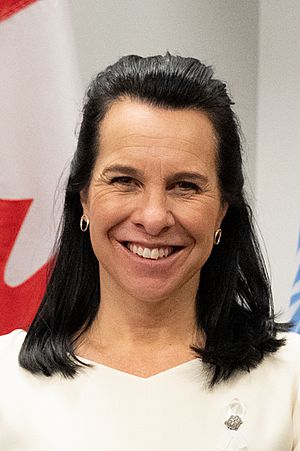Valérie Plante facts for kids
Quick facts for kids
Her Worship/Son Honneur
Valérie Plante
|
|
|---|---|

Plante in December 2022
|
|
| 45th Mayor of Montreal | |
| Assumed office 16 November 2017 |
|
| Preceded by | Denis Coderre |
| Leader of Projet Montréal | |
| In office 4 December 2016 – 15 March 2025 |
|
| Preceded by | Luc Ferrandez |
| Succeeded by | Luc Rabouin |
| Montreal City Councillor for Sainte-Marie | |
| In office 2013–2017 |
|
| Preceded by | Pierre Mainville |
| Succeeded by | Sophie Mauzerolle |
| Personal details | |
| Born | 14 June 1974 Rouyn-Noranda, Quebec, Canada |
| Political party | Projet Montréal |
| Residences | Montreal, Quebec, Canada |
| Alma mater | Université de Montréal |
Valérie Plante, born on June 14, 1974, is a Canadian politician. She has been the 45th and current mayor of Montreal since 2017. She was first elected to the Montreal City Council in 2013. Since December 2016, she has been the leader of the Projet Montréal party.
Plante was the candidate for Projet Montréal in the 2017 city election. She was elected Mayor of Montreal on November 5, 2017. She is the first woman to be elected mayor of Montreal. Before her, only a few women had briefly served as acting mayor or in a ceremonial role.
Contents
Valérie Plante's Early Life and Education
Valérie Plante was born in Rouyn-Noranda, Quebec, on June 14, 1974. As a teenager, she spent a year in North Bay, Ontario, to learn English. In 1994, she moved to Montreal to attend university.
She earned a degree in anthropology in 1997. Later, she received another degree in museology in 2001. Both degrees were from the Université de Montréal. After her studies, she worked for several non-profit groups. She was notably the communications director for the Girls Action Foundation. In the 1990s, she also worked as a tour guide at Vimy Ridge in France.
Valérie Plante's Political Journey
Becoming a City Councillor
In the 2013 Montreal city election, Valérie Plante was elected as a councillor. She represented the Sainte-Marie district in the Ville-Marie area. She won against Louise Harel, a former provincial minister. Plante was then named the opposition critic for downtown, tourism, and women's affairs. She also became the vice-president of the city council. She served as a substitute mayor for Ville-Marie as well.
In the fall of 2016, Plante announced she would run to become the leader of Projet Montréal. She won the leadership election with 51.9% of the votes, defeating Guillaume Lavoie.
Running for Mayor in 2017
Valérie Plante was elected Mayor of Montreal on November 5, 2017. She made history as the first woman to lead the city in its 375-year history. Many people did not expect Plante to win against the mayor at the time, Denis Coderre. He was a former federal Liberal Member of Parliament and a cabinet minister.
Plante won over voters by promising to improve public transportation. She also aimed to reduce traffic problems and make the city more friendly for families. On election day, Plante received 51 percent of the votes. Coderre received 46 percent. Her party, Projet Montréal, also won most of the seats on the Montreal City Council.
One of Plante's main promises in the 2017 election was to create a "Pink line". This new Montreal Metro line would improve public transit. It would connect downtown with the boroughs of Montréal-Nord and Lachine. Plante believed her campaign posters were placed in areas where her ideas would spread easily.
Re-election as Mayor in 2021
Valérie Plante won the election on November 7, 2021, against Denis Coderre again. She won by a larger difference this time, getting 52 percent of the votes. Coderre received 37 percent. Projet Montréal also gained more seats on the city council. Plante's campaign focused on adding 60,000 social housing units. She also promised to continue improving city life.
On October 23, 2024, Plante announced that she would not seek a third term as mayor. The next election is scheduled for November 2, 2025. She will continue to serve as mayor until her current term ends.
Valérie Plante's Family Life
Valérie Plante has two children. She is married to Pierre-Antoine Harvey. He is an economist who works with the Centrale des syndicats du Québec.
See also
 In Spanish: Valérie Plante para niños
In Spanish: Valérie Plante para niños

